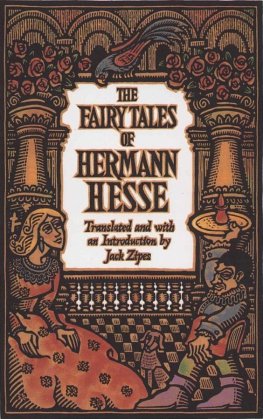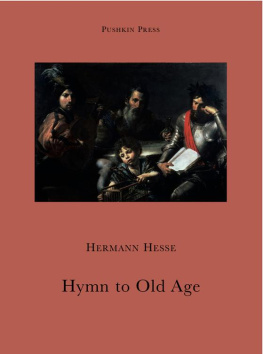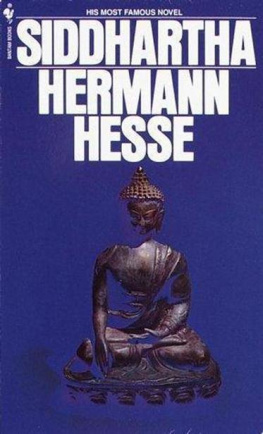Hermann Hesse - Magister Ludi
Here you can read online Hermann Hesse - Magister Ludi full text of the book (entire story) in english for free. Download pdf and epub, get meaning, cover and reviews about this ebook. year: 1982, publisher: Bantam Books, genre: Religion. Description of the work, (preface) as well as reviews are available. Best literature library LitArk.com created for fans of good reading and offers a wide selection of genres:
Romance novel
Science fiction
Adventure
Detective
Science
History
Home and family
Prose
Art
Politics
Computer
Non-fiction
Religion
Business
Children
Humor
Choose a favorite category and find really read worthwhile books. Enjoy immersion in the world of imagination, feel the emotions of the characters or learn something new for yourself, make an fascinating discovery.
- Book:Magister Ludi
- Author:
- Publisher:Bantam Books
- Genre:
- Year:1982
- Rating:4 / 5
- Favourites:Add to favourites
- Your mark:
- 80
- 1
- 2
- 3
- 4
- 5
Magister Ludi: summary, description and annotation
We offer to read an annotation, description, summary or preface (depends on what the author of the book "Magister Ludi" wrote himself). If you haven't found the necessary information about the book — write in the comments, we will try to find it.
Magister Ludi — read online for free the complete book (whole text) full work
Below is the text of the book, divided by pages. System saving the place of the last page read, allows you to conveniently read the book "Magister Ludi" online for free, without having to search again every time where you left off. Put a bookmark, and you can go to the page where you finished reading at any time.
Font size:
Interval:
Bookmark:
a.b.e-book v3.0 / Notes at EOF
Magister Ludi
(The Glass Bead Game)
Hermann Hesse
Translated from the German
Das Glasperlenspiel
by Richard and Clard Winston
with a Forword by
Theodore Ziolkowski
Back Cover:
This is Hesse's last and greatest work, a triumph of imagination which won for him the Nobel Prize for Literature. Described as "sublime" by Thomas Mann, admired by Andr Gide and T. S. Eliot, this prophetic novel is a chronicle of the future about Castalia, an elitist group formed after the chaos of the 20th-century's wars. It is the key to a full understanding of Hesse's thought.
Something like chess but far more intricate, the game of Magister Ludi known as the Glass Bead Game is thought in its purest form, a synthesis through which philosophy, art, music and scientific law are appreciated simultaneously. The scholar-players are isolated within Castalia, an autonomous elite institution devoted wholly to the mind and the imagination...
"Part romance, part philosophical tract, part Utopian fantasy. Its theme is one that preoccupied Hesse earlier: the conflict between, and the need to synthesize, thought and action, intellect and the flesh... A fascinating novel, well translated at last."
-- Book-of-the-Month Club News
This low-priced Bantam Book
has been completely reset in a type face
designed for easy reading, and was printed
from new plates. It contains the complete
text of the original hard-cover edition.
NOT ONE WORD HAS BEEN OMITTED.
MAGISTER LUDI
recently published as THE GLASS BEAD GAME
A Bantam Book / published by arrangement with
Holt, Rinehart and Winston, Inc.
PRINTING HISTORY
Originally published in German under the title of
Das Glasperlenspiel, Copyright 1943 by
Fretz & Wasmuth Verlag AG Zrich
Holt edition published October 1969
Bantam edition / October 1970
2nd printing... October 19706th printing... December 1973
3rd printing... January 19727th printing... April 1974
4th printing... September 19728th printing... January 1976
5th printing... December 19729th printing... June 1976
10th printing... March 1978
All rights reserved.
English translation copyright 1969 by
Holt, Rinehart and Winston, Inc.
Foreword by Theodore Ziolkowski Copyright 1969 by
Holt, Rinehart and Winston, Inc.
This book may not be reproduced in whole or in part, by
mimeograph or any other means, without permission.
For information address: Holt. Rinehart and Winston, Inc.,
383 Madison Avenue, New York, N.Y. 10017.
ISBN 0-553-11916-8
Published simultaneously in the United States and Canada
PRINTED IN THE UNITED STATES OF AMERICA
Foreword
By Theodore Ziolkowski
The Glass Bead Game , Hermann Hesse's last major work, appeared in Switzerland in 1943. When Thomas Mann, then living in California, received the two volumes of that first edition, he was dumbfounded by the conspicuous parallels between Hesse's "Tentative Sketch of the Life of Magister Ludi Joseph Knecht" and the novel that he himself was writing, Doctor Faustus (1947). For all their differences in mood, style and theme, both works employ a similar fiction: a pleasant though somewhat pompous narrator recounts, with a sympathy matched only by his pedantry, the life of a man whom he loves and admires. Since in each case the narrator is incapable of fully comprehending the problematic genius of his biographical subject, an ironic tension is produced between the limited perspective of the narrator and the fuller vision that he unwittingly conveys to the reader. Both authors were obsessed, in addition, with the self-destructive course of modern civilization, and this concern pervades both novels. But Mann's view is more immediate. His narrator, Serenus Zeitblom, can see and hear the exploding bombs of World War Two as he writes, and the spectacular career of the composer Adrian Leverkhn parallels with ominous precision the history of Germany from the declining Empire through the shortlived brilliance of the Weimar Republic to the raging madness of National Socialism. In Hesse's novel, in contrast, that same period is described with the detachment of a narrator looking back at the "Age of the Feuilleton" from a vantage point in the distant future. Unlike Mann's Leverkhn, Hesse's Joseph Knecht succeeds in analyzing the dangers of an excessive aestheticism and acts to avert the catastrophe of intellectual irresponsibility. In both novels, finally, the authors slyly weave their experience of our culture into a pastiche of hidden quotations and characters clef.
Thomas Mann, immediately sensing that the serious theme of Hesse's novel was enclosed within "a cunning artistic joke," recognized the source of its humor in "the parody of biography and the grave scholarly attitude." But people won't dare to laugh, he wrote Hesse. "And you will be secretly annoyed at their dead-earnest respect." Hesse was pleased that his friend had put a finger on the comic aspect of the novel, but Mann's prediction was correct. In the quarter-century since its publication, The Glass Bead Game has enjoyed the adulation customarily awarded to literary "classics." Indeed, largely on its merits Hesse received in 1946 the Nobel Prize for which Mann, among others, had repeatedly nominated him. Hesse's opus magnum was one of the first works by a distinguished emigr to be published in Germany after the war, and it has been regularly reprinted there since 1946. The book was dutifully translated into English, Swedish, French, Spanish, Italian, and other languages. But the novel, whose title has supplied us with one of those imagistically suggestive catchwords for our age, like "the Waste Land" or "the Magic Mountain," has suffered the fate of many classics -- it is less frequently read than cited, more often studied than appreciated. In Germany many readers, blandly ignoring the implicit criticism in the novel, tended to see in Hesse's cultural province nothing but a welcome Utopian escape from the harsh postwar realities. More discerning European critics have usually been so preoccupied with the fashionably grave implications that they have neither laughed at its humor nor smiled at its ironies.
In part these one-sided readings are understandable, for the humor is often hidden in private jokes of the sort to which Hesse became increasingly partial in his later years. The games begin on the title-page, for the motto attributed to "Albertus Secundus" is actually fictitious. Hesse wrote the motto himself and had it translated into Latin by two former schoolmates, who are cited in Latin abbreviation as the editors: Franz Schall ("noise" or Clangor ) and Feinhals ("slender neck" or Collo fino ). The book is full of this "onomastic comedy" that appealed to Thomas Mann, also a master of the art. Thus Carlo Ferromonte is an italianized form of the name of the author's nephew, Karl Isenberg, who assisted Hesse with the music history that is interwoven with the history of the Glass Bead Game. The "inventor" of the Game, Bastian Perrot of Calw, gets his name from Heinrich Perrot, the owner of a machine shop where Hesse once worked for a year after he dropped out of school. The figure of Thomas von der Trave is a detailed and easily recognizable portrait of Thomas Mann, who was born in the town of Lbeck on the river Trave. In the person of Fritz Tegularius, Hesse has given us his interpretation of the brilliant but unbalanced character of Friedrich Nietzsche. And Tegularius' spiritual opponent in the novel, Father Jacobus, borrows some of his words and most of his ideas from Nietzsche's antagonist, the historian Jakob Burckhardt. The reader who fails to catch these sometimes obscure references is not only missing much of the fun of the book, he is also unaware of its implications in the realm of cultural history and criticism.
Font size:
Interval:
Bookmark:
Similar books «Magister Ludi»
Look at similar books to Magister Ludi. We have selected literature similar in name and meaning in the hope of providing readers with more options to find new, interesting, not yet read works.
Discussion, reviews of the book Magister Ludi and just readers' own opinions. Leave your comments, write what you think about the work, its meaning or the main characters. Specify what exactly you liked and what you didn't like, and why you think so.

